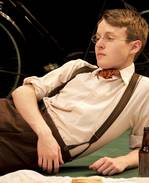SITE GUIDE
SEARCH
REVIEWS
REVIEW ARCHIVES
ADVERTISING AT CURTAINUP
FEATURES
NEWS
Etcetera and
Short Term Listings
LISTINGS
Broadway
Off-Broadway
NYC Restaurants
BOOKS and CDs
OTHER PLACES
Berkshires
London
California
New Jersey
DC
Connecticut
Philadelphia
Elsewhere
QUOTES
TKTS
PLAYWRIGHTS' ALBUMS
LETTERS TO EDITOR
FILM
LINKS
MISCELLANEOUS
Free Updates
Masthead
Writing for Us
A CurtainUp  London Review
London Review
 London Review
London ReviewMaking Noise Quietly
|
People struggling to be honest with each other and lead better, less neurotic lives.
— David Eldridge writing about Robert Holman’s plays in the theatre programme but using Holman’s own words.
|

(Photo:Johan Persson) |
In the first play, Being Friends, set in Kent countryside near Hadlow, two young men meet in the 1940s. Neither is fighting in the war for different reasons. Oliver Bell (Jordan Dawes) comes from a family of conscientious objectors in Manchester and is working as an agricultural labourer in Kent instead of serving in the army. Matthew Tennyson plays Eric Faber who has been too ill to join the army. Eric is provocative and stylishly camp as he lays out his picnic to share it with Oliver whom he has just met accidentally. They are both social outcasts: Oliver for his anti-war political views and Eric for his homosexuality. “I do love recklessness, ” says Eric with a delicious irony as he lays out a floral embroidered tablecloth on which to serve the picnic.
The men discover much that they can talk about, sex and sexuality and how they feel about the war and the doodle bugs which are falling on South East England in 1944. The overall effect is a touching and evocative piece which sees Oliver risk joining Eric in an act of daring companionship.
In the middle play, Lost, set some forty years later in the early 1980s, Naval Lieutenant Geoffrey Church (John Hollingworth) has to visit the mother of an officer killed in the Falklands war to deliver the bad news. Susan Brown plays May Appleton the woman who has been estranged from her son Ian and didn’t even know for certain that he had gone to the Falklands to fight. It later emerges that she hadn’t heard from her son for over a decade and didn’t know he was married to Lt Church’s sister Hilary.
These two people skirt round the sensitivities on both sides as Mrs Appleton empathises with the pressure Church has with “high up” naval connections in his family and they make polite, distanced conversation. Such is the detachment of May Appleton that she doesn’t ask about her son’s wife or whether they had any children which would seem to me to be a mother’s natural response to the news that her son had been married for some time. Repressed disappointment is the emotion here on her side and for him it is an inability or impossibility to deliver bad news in a palatable or adequate way as he judges himself harshly. We are left wondering what it was that made Ian cut off his parents. The sense of loss is doubled.
In the final play, Making Noise Quietly, set in Germany in the 1980s, sees an English soldier Alan Todd (Ben Batt) attempting to parent his wife’s deserted and disturbed child, eight year old Sam (Jack Boulter). He meets Helene Enssun (Sara Kestelmanan), an elderly artist in the German countryside. She's a victim of the Holocaust who will help the inexperienced and exasperated soldier see what the boy needs. It is a lesson in patience and will power as Sam communicates in a series of grunts or by writing on his legs and arms with a felt tip pen and is a wild child, stealing anything that takes his fancy. Todd responds by hitting the child. Helene and Alan compare their lives, hers in the concentration camp, his in children’s home after children’s home. This strange meeting of the uncouth soldier and the German artist sees him divulging his life story as these three casualties of humanity try to find a way forward.
The sets are simple: a bicycle for the 1940s, two chairs for Mrs Appleby and a tree in the Black Forest for the final play. At each scene change all the actors from all three plays crisscross the stage in near darkness, an evocative visual network of intermeshed lives. These plays seem perfect for Peter Gill’s subtlety of direction with super performances from the cast and make me want to see more of Robert Holman’s writing.
|
Subscribe to our FREE email updates with a note from editor Elyse Sommer about additions to the website -- with main page hot links to the latest features posted at our numerous locations. To subscribe,
E-mail: esommer@curtainup.comesommer@curtainup.com
put SUBSCRIBE CURTAINUP EMAIL UPDATE in the subject line and your full name and email address in the body of the message -- if you can spare a minute, tell us how you came to CurtainUp and from what part of the country. |
| Making Noise Quietly
Written by Robert Holman Directed by Peter Gill Starring: Matthew Tennyson, Jordan Dawes, Susan Brown, John Hollingworth, Sara Kestelman, Ben Batt, Lewis Andrews/Jack Boulter/Ethan Hammer Designed by Paul Wills Lighting: Paul Pyant Sound: Emma Laxton Running time: Two hours and 15 minutes with one interval Box Office: 0844 871 7624 Booking to 26th May 2012 Principal Sponsor: Barclays Season support: Arielle Tepper Madover Reviewed by Lizzie Loveridge based on 24th April 2012 performance at the Donmar Warehouse, Earlham Street, London WC2H 9LX (Tube: Covent Garden) |
|
REVIEW FEEDBACK Highlight one of the responses below and click "copy" or"CTRL+C"
Paste the highlighted text into the subject line (CTRL+ V): Feel free to add detailed comments in the body of the email . . . also the names and emails of any friends to whom you'd like us to forward a copy of this review. |




